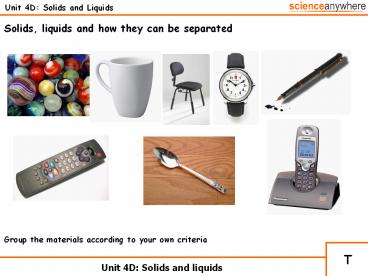Unit 4D: Solids and Liquids - PowerPoint PPT Presentation
Title:
Unit 4D: Solids and Liquids
Description:
Unit 4D: Solids and liquids. Unit 4D: Solids and Liquids ... Flour. Sugar. Instant Coffee. Salt. Does not dissolve. Dissolves. Substance. I ... – PowerPoint PPT presentation
Number of Views:825
Avg rating:3.0/5.0
Title: Unit 4D: Solids and Liquids
1
Unit 4D Solids and Liquids
Solids, liquids and how they can be separated
Group the materials according to
your own criteria
T
2
Unit 4D Solids and Liquids
- Some useful words
- Melt
- Freeze
- Solidify
- Dissolve
- Solution
- Undissolved
- Filter
when a solid changes to a liquid
when a liquid changes to a solid
a liquid changes to a solid
when a solid disappears in a liquid
a liquid with a solid dissolved in it
when a solid doesnt disappear
a way of getting undissolved solids out of a
liquid
V
3
Unit 4D Solids and Liquids
- Solids and Liquids
- Group the materials according to your own
criteria
There are 2 main groups liquids and solids
A
4
Unit 4D Solids and Liquids
- cont
- Are all the liquids colourless?
- What will happen to a liquid if the container it
is in is changed? - Can you spill the solids?
- What happens if you tilt the bottle the liquids
are in?
Solids Liquids
Retain shape
Take shape of container
Fixed volume (amount of space it takes up)
Volume changes
Flow
Particles packed very close together
Particles close together but can move a little
A
5
Unit 4D Solids and Liquids
- cont
- Are the following Solids or Liquids. Try to
give a reason for your answers - Cotton wool
- Sand
- Shampoo
- Rice
- Jelly
- Soup
- Syrup
D
6
Unit 4D The shape and volume of liquids
- The shape and volume of liquids
D
7
Unit 4D Powders
- Powders
- Some solids consist of very small pieces, such
as sand, are sometimes called powders. They
behave in a similar way to liquids
D
8
Unit 4D One material, two states
- One material, two states
- Many materials can exist as a solid or a liquid.
When it changes from solid to liquid we say it
melts. When it changes from a liquid to a solid
we say it solidifies or freezes
D
9
Unit 4D Melting solids
- Melting solids
D
10
Unit 4D Melting solids
- cont
- Melting and solidifying or freezing are changes
that can be reversed and are the reverse of each
other
D
11
Unit 4D Mixing Solids
- Mixing Solids
- How can the 2 solids be separated?
A
12
Unit 4D Mixing Solids
- cont
- How do you think you can separate
- Dried peas and paper clips.
- Stones and salt.
- Why do you think each method will work?
A
13
Unit 4D Mixing Solids and Liquids
- Mixing Solids and Liquids
- Investigate what happens when the each of the
following is mixed with water - Salt Sand
- Instant coffee Marbles
- Sugar Plaster of Paris
- Flour Paint
- Record your results
Substance Dissolves Does not dissolve
Salt
Instant Coffee
Sugar
Flour
Sand
Marbles
Plaster of Paris
Paint
I
14
Unit 4D Separating the undissolved solids
- Separating the undissolved solids
- How can we separate the marbles from the water
- Would this method work with the sand?
A
15
Unit 4D Separating the undissolved solids
- cont
- Filter paper is like a sieve but the holes are
very, very small - only very small particles like
water can pass through the holes.
A
16
Unit 4D Filtering dissolved solids
- Filtering dissolved solids
- Using filter paper and a funnel, filter the salt
water you made. - Do you think the salt will be filtered out like
the sand was? Try to give a reason for your
answer
If the solid has dissolved it means that the
particles must be smaller than the water
particles so they can hide between them. This
means they can get through the filter paper
A
17
Unit 4D Summary
S































